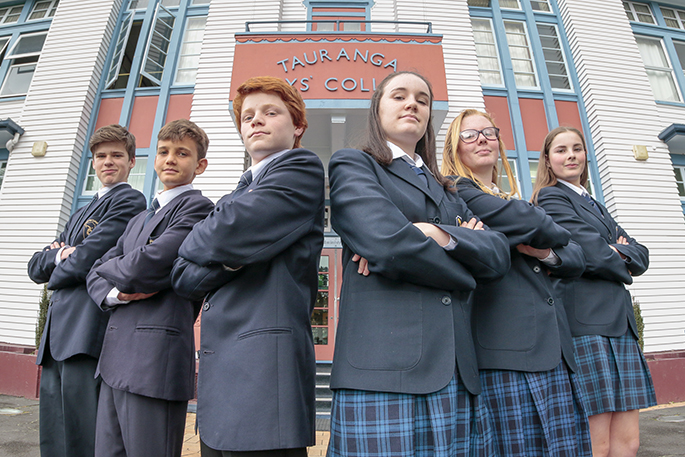It's 1893, and society is dominated by women who have been voting since New Zealand's first General Election was held in 1853.
They are fully engaged in work, society and political life. Men are the primary homemakers and responsible for rearing children – after the women have given birth.
Now men have decided they want a say in governing the country too. They are holding meetings and gathering signatures on a suffrage petition to present to parliament.
The debate rages as to whether it would do the country any good whatsoever for men to be granted the vote, with many viewing it as an attack on natural gender roles that could lead to the breakdown of society.
This new ‘herstory' is the scenario students from Tauranga Boys' and Girls' Colleges will be faced with when they debate the moot ‘1893, Why Should Men Get the Vote?' on September 4 as part of the city's Suffrage 125 event programme.
The boys – James Ngamoki, Blake Cooper, Theo Lafont and reserve Callum Berkett – will argue the affirmative and the girls – Ella Mitchell, Stella Thompson, Romy Heayns or Inaya Sinclair – will argue the negative.
2018 marks the 125th anniversary of women's suffrage in New Zealand. On September 19, 1893 the Electoral Act 1893 was passed, giving all women in New Zealand the right to vote.
The above scenario is the brainchild of Debbie McCauley, Tauranga librarian and member of the Tauranga's Suffrage 125 Committee.
'I'm working on a children's book for Suffrage 125, and I came across some quotes [by men opposing women getting the vote] and decided to twist them into a scenario,” explains Debbie.
The boys say they feel bad for the girls. 'They've got the more difficult side to argue,” says Theo.
'It's good because it's making us think about how difficult it was for women back then,” says Blake. 'I'm sure it was frustrating.”
Romy agrees debating the negative will be difficult, because equality is something they have grown up with.
'In this day and age most people believe in equality,” says Romy. 'That opinion is in our heads so it will be hard to come up with counter arguments.”
The two schools often get together to debate, but not usually in front of an audience. 'It will good for the debate, but not for our nerves,” says James.
Suffrage 125 will be marked by a number of events in the Western Bay of Plenty, including talks from former Prime Minister Helen Clark and Labour MP Jan Tinetti, and documentary film screenings based on the lives and work of social advocate Celia Lashlie and Maori filmmaker Merata Mita.
Award-winning artist Jo Torr's exhibition Vahine-Wahine is on in the People's Gallery at the Historic Village until August 28.
The sculptural work reflects on the position of women through history, with each sculpture taking the form of a garment that incorporates an aspect of Polynesian/Maori or European cloth and an aesthetic sensibility associated with either culture.
Katikati will host a Suffrage 125 Commemoration on Saturday, September 15, beginning with a march through town in period costume and guest speaker Helen Clark.
Also on September 15, Frocks on Bikes will host a special Suffrage 125 bicycle ride with people encouraged to dress in vintage style or the New Zealand suffrage colours of gold, white and violet. The ride will conclude with a shared picnic afternoon tea at The Elms.
For a full list of local Suffrage 125 events, visit the Suffrage 125 Tauranga 1893-2018 Facebook page. The school's debate on September 4 will be held at 5.30pm in Tauranga City Council chambers on Willow Street. Tickets are free but attendees must register via: www.eventfinda.co.nz



0 comments
Leave a Comment
You must be logged in to make a comment.